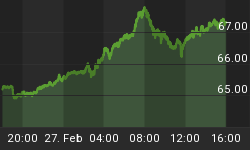China's economic engines of growth have begun to accelerate again, but you wouldn't know it by looking at the chart below. After approvals for new railroad projects spiked to a five-year high in the third quarter of 2010, the number of new plans slowed, then completely halted throughout 2011, decreasing 89 percent by value, says J.P. Morgan.

There were multiple reasons for the slowdown in railroad construction, says BCA. A bullet train crash caused heightened concern for safety last summer. Also, the government intentionally delayed projects as it pulled the brakes to decelerate growth and curb inflation.
Since China received signs of slowing inflation over the past few months, it can now shift its attention toward growth. Recent policies are sending a "full steam ahead" message to railway investment. According to J.P. Morgan, in December and January, China announced tax benefits on interest income for railway bondholders, issued bonds for railway projects, and injected cash into the two largest train makers. This concerted effort should help the country meet its long-term goal to connect 100 percent of cities with a network of high-speed rail.

CLSA's Andy Rothman and I will be discussing in greater detail the development of China's infrastructure system and consumer demand during our webcast, Navigating China's Transition to a Consumer-Driven Economy, on April 5. Over the past two decades, China's railway system has come a long way very quickly, with track length increasing 50 percent since 1995, says BCA. However, demand has increased at a faster rate, though, as "passengers travelling on the country's railway system per year doubled during the same period, while railway freight increased by 150 percent," says BCA.
And, on a per capita basis, China's rail length is much lower than most major economies, according to BCA Research. When you compare the total length of railways in developed and emerging markets, Australia has the most rail per capital, with 1.77 kilometers of railway per 1,000 persons; Brazil has considerably less, with only 0.15 kilometers of rail track per 1,000. However, as you can see below, China lands in last place for the total length of railway per capita.

Although China has been busy constructing its railways over the past few years, this comparison shows that this infrastructure buildout has been more of a "catch-up process," rather than an "overshoot," says BCA.
All opinions expressed and data provided are subject to change without notice. Some of these opinions may not be appropriate to every investor.















